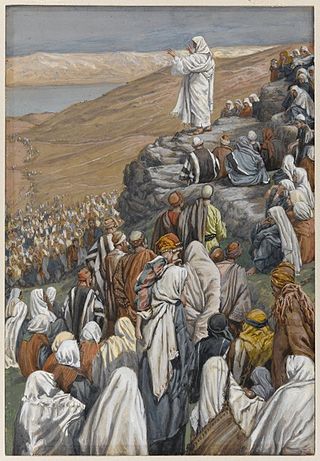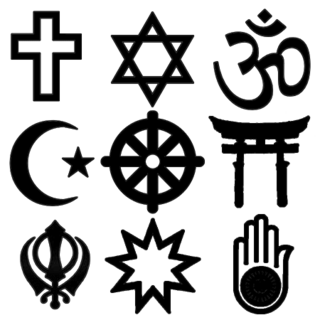
Secular humanism is a philosophy,belief system,or life stance that embraces human reason,logic,secular ethics,and philosophical naturalism,while specifically rejecting religious dogma,supernaturalism,and superstition as the basis of morality and decision-making.

Friedrich Daniel Ernst Schleiermacher was a German Reformed theologian,philosopher,and biblical scholar known for his attempt to reconcile the criticisms of the Enlightenment with traditional Protestant Christianity. He also became influential in the evolution of higher criticism,and his work forms part of the foundation of the modern field of hermeneutics. Because of his profound effect on subsequent Christian thought,he is often called the "Father of Modern Liberal Theology" and is considered an early leader in liberal Christianity. The neo-orthodoxy movement of the twentieth century,typically seen to be spearheaded by Karl Barth,was in many ways an attempt to challenge his influence. As a philosopher he was a leader of German Romanticism. Schleiermacher is considered the most important Protestant theologian between John Calvin and Karl Barth.

Stanley Martin Hauerwas is an American Protestant theologian,ethicist,and public intellectual. Hauerwas originally taught at the University of Notre Dame before moving to Duke University. Hauerwas was a longtime professor at Duke,serving as the Gilbert T. Rowe Professor of Theological Ethics at Duke Divinity School with a joint appointment at the Duke University School of Law. In the fall of 2014,he also assumed a chair in theological ethics at the University of Aberdeen. Hauerwas is considered by many to be one of the world's most influential living theologians and was named "America's Best Theologian" by Time magazine in 2001. He was also the first American theologian to deliver the prestigious Gifford Lectures at the University of St. Andrews in Scotland in over forty years. His work is frequently read and debated by scholars in fields outside of religion or ethics,such as political philosophy,sociology,history,and literary theory. Hauerwas has achieved notability outside of academia as a public intellectual,even appearing on The Oprah Winfrey Show.
John Edmund Hare is a British classicist,philosopher,ethicist,and currently the Noah Porter Professor Emeritus of Philosophical Theology at Yale University.

Christian ethics,also known as moral theology,is a multi-faceted ethical system. It is a virtue ethic,which focuses on building moral character,and a deontological ethic which emphasizes duty. It also incorporates natural law ethics,which is built on the belief that it is the very nature of humans –created in the image of God and capable of morality,cooperation,rationality,discernment and so on –that informs how life should be lived,and that awareness of sin does not require special revelation. Other aspects of Christian ethics,represented by movements such as the social Gospel and liberation theology,may be combined into a fourth area sometimes called prophetic ethics.
The University of Chicago Divinity School is a graduate institution at the University of Chicago dedicated to the training of academics and clergy across religious boundaries. Formed under Baptist auspices,the school today is without any sectarian affiliation.
Elias Kifon Bongmba is a Cameroonian-American theologian.
Nancey Murphy is an American philosopher and theologian who is Professor of Christian Philosophy at Fuller Theological Seminary,Pasadena,CA. She received the B.A. from Creighton University in 1973,the Ph.D. from University of California,Berkeley in 1980,and the Th.D. from the Graduate Theological Union (theology) in 1987.

Humanism is a philosophical stance that emphasizes the individual and social potential,and agency of human beings,whom it considers the starting point for serious moral and philosophical inquiry.
Anthony B. Pinn is an American professor working at the intersections of African-American religion,constructive theology,and humanist thought. Pinn is the Agnes Cullen Arnold Professor of Humanities and Professor of Religious Studies at Rice University. He is founder and executive director of the Center for Engaged Research and Collaborative Learning in Houston,Texas,and Director of Research for the Institute for Humanist Studies in Washington,D.C.
Moral syncretism consists of the attempt to reconcile disparate or contradictory moral beliefs,often while melding the ethical practices of various schools of thought.
Graham John Ward is an English theologian and Anglican priest who has been Regius Professor of Divinity at the University of Oxford since 2012.

Religious values reflect the beliefs and practices which a religious adherent partakes in. Most values originate from sacred texts of each respective religion. They can also originate from members of the religion.
James M. Gustafson was an American theological ethicist.
The Centre for Theology and Public Issues (CTPI) is a research centre based in New College,the School of Divinity at the University of Edinburgh. Founded in 1984 by Duncan B. Forrester,CTPI promotes Christian theological reflection and research on important public issues. CTPI research is global in orientation and rooted in the tradition of public theology. Issues are examined by bringing together theologians,social scientists,church leaders,policy makers,artists,and the public. CTPI has particularly close relations with the Scottish Parliament and other institutions of Scottish public life. The current director is Jolyon Mitchell.

Werner Günter Adolf Jeanrond was Professor of Systematic Theology with special responsibility for Dogmatics at the University of Oslo. He is retired.
The following is a bibliography of John D. Caputo's works. Caputo is an American philosopher closely associated with postmodern Christianity.
Mark D. Jordan is a scholar of Christian theology,European philosophy,and gender studies. He is currently the Richard Reinhold Niebuhr Research Professor of Divinity at Harvard Divinity School and Professor of the Studies of Women,Gender,and Sexuality in the Harvard Faculty of Arts and Sciences.
Gilbert Meilaender is an American Lutheran bioethicist and theologian. He is Senior Research Professor of Theology at Valparaiso University,and served on the President's Council on Bioethics from its founding in 2002 until its dissolution in 2009.
Teresia Mbari Hinga was a Kenyan Christian feminist theologian and a professor of religious studies at Santa Clara University in California. She was a founding member of the Circle of Concerned African Women Theologians.






